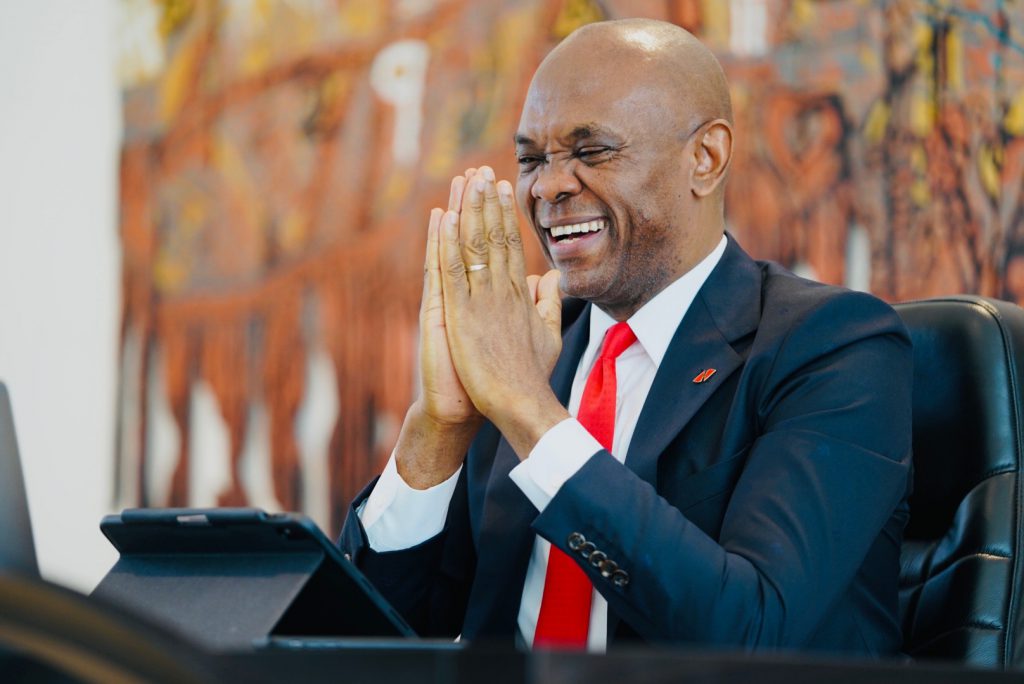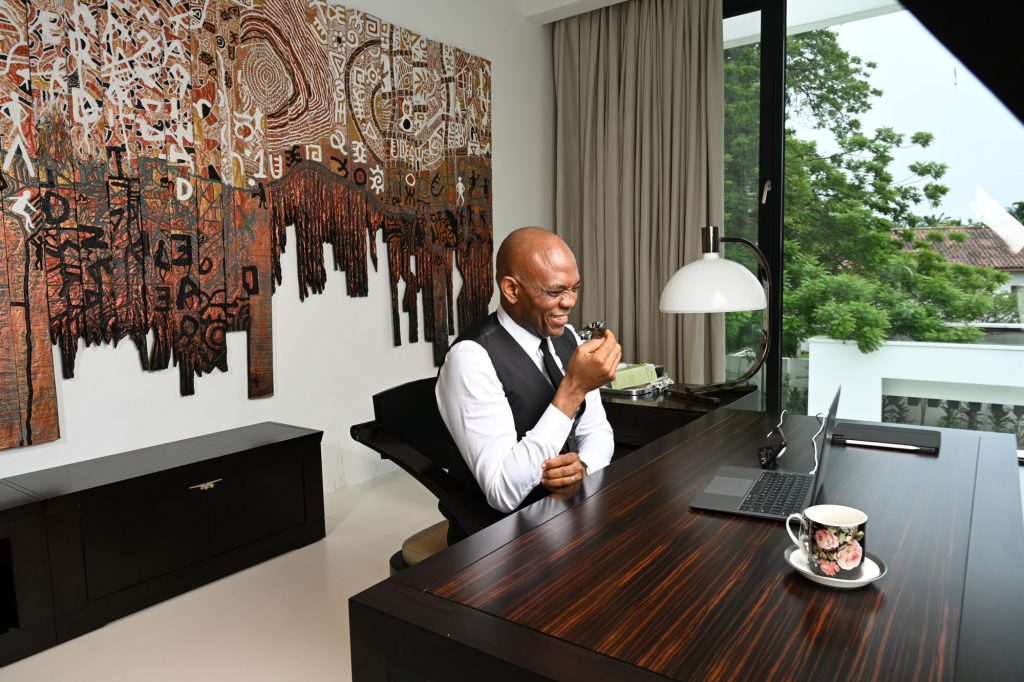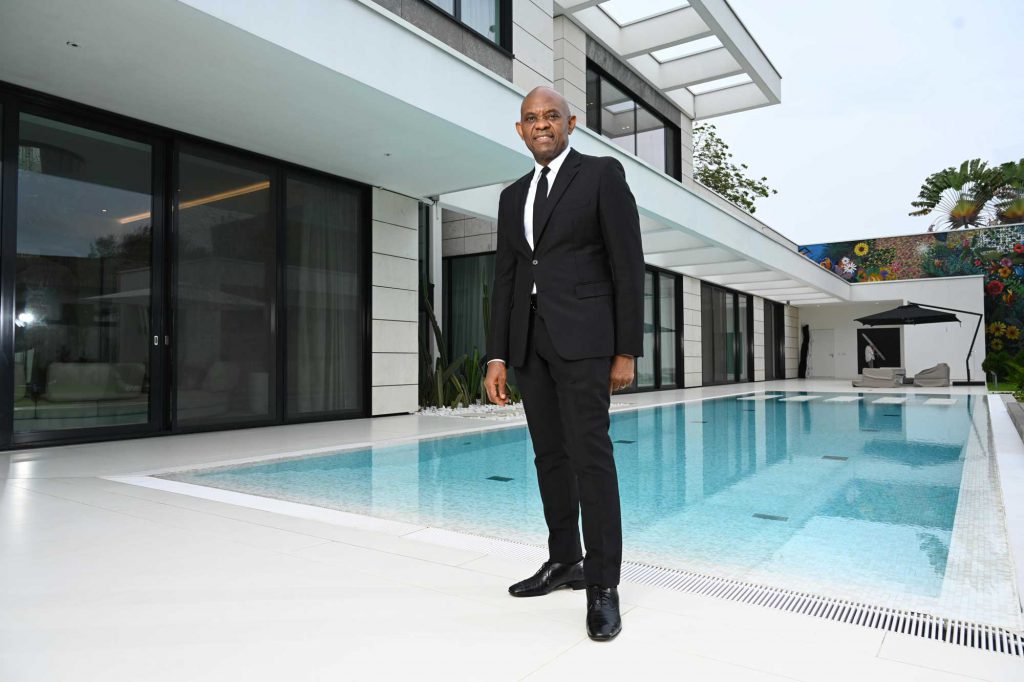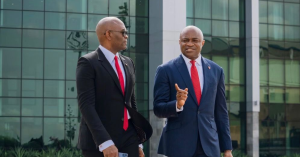At the age of 20, did you envisage your current self?
At the age of 20 I was still on the university campus thinking of parties and academic course work rather than thinking of entrepreneurship! But let’s just say that my life has been filled with a lot of interesting experiences. Deciding to study economics at university is all about learning about the business world. Growing up around my parents and the other influences around us, I always felt that I would end up in the business world – what we call entrepreneurship today.
My mother was a big influence. She owned a restaurant and during the holidays I would stay there and help. I used to think, imagine if she did this at a larger scale, she could get more customers and make more profits, so in essence I was becoming more aware of how the world of commerce worked. But these were not overriding thoughts at the time.
At that age, my aim was to finish my first degree in economics, do my masters and work in a bank. I wanted to dress like the power dressers in the banking sector – wear suspenders, brogue shoes, the whole outfit. I liked the lifestyle!
In Nigeria, before you start work, you are required to join the National Youth Service Corps (NYSC). I was posted to the country’s northern region where I found myself reading a weekly magazine column which explored business ideas such as bakeries or fish ponds.
I started wondering how much setting up a bakery or any other enterprise would cost, how to manage it, how to make a profit and so on. I vaguely thought that perhaps one day, I would like to start a business myself.
So, although I was more focussed on becoming a banker and wearing my suspenders, my mind was subconsciously shaping and crystallising ideas that eventually led to where we are today.
What would you say were the essentials you needed on your entrepreneurial journey? What inspired you?
To begin with, the road to success is not linear, it is up and down. You have to be very determined and be prepared to do whatever is required for your success. And you have to know what success looks like in your chosen field.
For example, you know that if you want to go to university, you must first get the required grades from secondary school and to do that, you have to make sacrifices and work very hard. For that you need ironclad discipline.
It is the same if you want to succeed in business. That kind of discipline and training helps a great deal. If you want to become an entrepreneur, you have to acknowledge that it is not a bed of roses.
Ask yourself what does it take to succeed? And what I tell people is that you must have laser focus, be disciplined, realise that sacrifices need to be made and I repeat, be prepared to work very hard.
Of course you must have ambition. You must seek out opportunities and have a platform on which to start implementing your vision. You should think long term, 10 years ahead, not just for tomorrow.
Once you have accepted this, you can say, let’s give it a go, let’s try it but make sure you stick to the principles I mentioned. Successful entrepreneurs have these principles ingrained in them. They expect challenges because overcoming challenges provides opportunities.

Can you recall your very first entrepreneurial venture?
Yes I do. I did my NYSC stint in Sokoto, Northern Nigeria. They make very good ‘Babaringa’ which is a three-piece local costume that is very popular throughout the country. I used to buy these alongside local hand-made mats and sell them to friends in the other end of the country, in the South. I made a little money from this which was very welcome as we were on a small stipend. It was exciting to see these little savings accumulate in my bank account.
Later in life, I became interested in real estate and property and that helped in building capital.
I also started assessing opportunities in other parts of the world. My inspiration came from reading the US Fortune magazine and finding out what was happening in corporate America. It was interesting to see how business decisions were made. I studied market trends and prepared myself for something similar happening in our part of the world.
Today, when I discuss with my daughter, I tell her that knowing economic history, business history is very important. It also helps to build self-confidence.
What sort of entrepreneurship should young people aim for?
Different people will have different views on entrepreneurship at different levels. Some leave school and immediately want to go into the food business – they see that there are food supply shortages while there is a lot of arable land in Africa. Some want to go into the technology sector.
Some, like me, start mid-way in our careers and some start much later. But what is important is recognising opportunities when they come up and preparing yourself to take advantage of the opportunities – and making sure you achieve meaningful success.
Opportunities don’t come twice. If you miss it the first time, you might have missed it forever.
At the Tony Elumelu Foundation, we train and provide seed capital to young Africans. To date about 10,000 young Africans have been funded from our programme with over 1 million young Africans being supported on TEFConnect.com
My advice to budding young entrepreneurs when I interact with them is to be hardworking, don’t be scared to dream but know that dreaming is less than 1%; the 99% is about translating your dream into action, translating your dream to reality. That is what makes the difference.
Also, I cannot repeat this often enough: that process of translating to action requires a lot of hard work, discipline, staying focused and making sacrifices for a better tomorrow. The Tony Elumelu you see today has not always had everything. In the past, for example, I have decided not to buy a car and planned instead to use the money to make investments and wait for the proceeds of that investment to help me buy the car, and that happened!
When I say sacrifices, I mean you have to learn to defer consumption. You need to think long term. It is when you visualise success that you can make the sacrifices, then you can apply the rigour and energy that will lead you to success.
I think those are the values we need in our young ones and that we foster at the Tony Elumelu Foundation today.
You can get there by taking that first step, the journey of one mile starts with one step. So start, count the steps consistently, and stay focused.
Would you say that there are more opportunities now compared to when you started?
Opportunities in my view point are always there, but now it seems to me that we have more opportunities in the world around us than ever before.
The digital world is a whole new economy that never existed when we started – and entry to that digital world is not so difficult. Use your brain, your discipline, your expertise and then the world just comes to you.
Having said that, I must recognise the fact that while you have a lot of opportunities, you are often in an operating environment that is tough. That is why at the Tony Elumelu Foundation, beyond providing seed capital to young entrepreneurs we spend a lot of time on advocacy.
We must create the enabling environment that will assist and enable our young ones to succeed in their entrepreneurial drive. We must realise if our young men and women, succeed, our continent succeeds.
That must be in the subconscious of everyone – from business leaders to policy makers. We owe these young ones the right environment to succeed and to give them inspiration, to support them.
At the Tony Elumelu Foundation we provide $5,000 non-refundable seed capital every year to thousands of young Africans from across all 54 African countries. We have also scaled our programme to reach even more young entrepreneurs in conjunction with our global partners.
We do this not because we have so much money, but because we think about helping to democratise wealth and helping to democratise success – and making sure that we have more people on our continent succeeding.
Young people need mentorship, they need inspiration, they need motivation, they need capital. They need us to help them create opportunities for them.
We created the TEFConnect platform at the Tony Elumelu Foundation to help connect over one million young African entrepreneurs so they can trade with one another, so they can transact and even know what others around the continent have to offer. We believe that our young ones should have a networking platform to enable them to succeed.
We believe that our young ones need good transportation systems, we believe that our young ones need improved access to electricity. We believe that our young ones need fair and favourable tax policies and we believe they need good security to help them succeed.
These are the things that if we put in place, will enable them to succeed. This is the difference between young entrepreneurs in Africa and young entrepreneurs in other parts of the world.
In 2018, when I hosted French President Macron in Lagos at a convening of over 2000 entrepreneurs, someone asked a question that if Steve Jobs were African, would he have succeeded? Well, it’s a tough question that our leaders and all of us should keep asking ourselves. What are we doing to identify and project our own young African Steve Jobs?

What major opportunity do you think Covid-19 has presented to the entrepreneur ecosystem in Africa?
It’s actually a mixed one. On one hand I see a lot of opportunities as a result of the pandemic. New businesses, new business opportunities, new and more intelligent ways of doing things. For example, before Covid, you would have had to get a visa to fly to Nigeria to have this interview, we took for granted that systems like zoom existed, we didn’t know that it would be so smooth.
However, there has been a devastating impact on many African MSMEs. We have seen first-hand at the Tony Elumelu Foundation how resilient the young entrepreneurs we have supported through the Tony Elumelu Foundation Entrepreneurship Programme have been, performing better on average in terms of profitability and survivability, post pandemic. They have combined the mentorship, business training, market access, funding and other holistic support received from the Foundation, to navigate these setbacks in very interesting ways.
It is a mixed feeling but I think we should be more optimistic – which is what entrepreneurship is all about, more forward looking entrepreneurship and knowing that business is not just about today, it’s about today and tomorrow.
We should count our losses and keep the spirit up. I do think that the way we handle things in the world has changed completely and with that change comes a new world of opportunities. We should sit down and get thinking, can this idea work, might it work, what do I need to do?
This year during The TEF Entrepreneurship Programme selection, we want to see more ideas of what people can do arising from this pandemic. In the health sector for instance, a whole lot of new opportunities have come along – things we didn’t prioritise, things we didn’t take seriously. We know now they are much more important than they were before.
I tell young Africans that we can choose to sit down and just weep and complain but we can also say in spite of these challenges, what can we do? That is why as business leaders, we must keep asking if we’re doing enough in capacity building, in hand-holding and inspiring and encouraging our young ones because, ultimately, we must be ready to pass the baton onto them and soon.
For young entrepreneurs who had their business collapse during this pandemic, what must they do to get back on track?
Personally, my rise in the business world has been through business turnaround and it starts from understanding the business itself. What is the business? What are the critical success factors for this business? What are we doing right? What are we not doing correctly? What are the external impacts on the business? And is there any way we can reposition in view of the new normal?
My advice to young entrepreneurs is take a step back, understand your business, looks at the forces, the factors that shape your business and dispassionately reassess and see what you need to do differently.
Quitting is not something I advise people to do but please don’t make a sentimental or emotional decision. Think it through very well; if you have mentors, sit with them. Also, the new world we live in is a world of information and knowledge – with just at a click of your device, you can have access to so many things in terms of knowledge.
Find out what’s happening but please be dispassionate in your business decisions. A lot of businesses fail because people are not being dispassionate when they make business decisions.
What single, most important message do you do have for policy makers when discussing entrepreneurship in Africa?
I have many but one we should focus on, improving access to electricity in Africa.
Improving access to electricity in Africa will unlock the wealth of this continent; but lack of access to electricity is holding us back.

Who are the people you admire the most?
I can think of four people, two of the people have passed away. One is Steve Jobs and the other is Michael Jackson.
With Steve Jobs, can you just imagine a man founded a business and after his death, the business he founded became the first company to cross a trillion dollar market cap!
I think the key aspirations for every business in the world, should be building a business that lasts and not be one you live and die with. I believe that when you are gone, the business should still be there and grow better, that is what Steve Jobs did.
Steve Jobs has changed the world through his wonderful devices. Long after his death, the company he founded was the first to cross a trillion. I like that guy because in addition to all the other aspects, the discipline he showed and everything he has achieved in the short period he was on earth.
The second person is Michael Jackson, we all saw him as an entertainer but watch his movie, This is it, that came out just after he passed. He was going to go on a world tour before he died and to see how he was preparing, practicing twice a day, up to three times a day and everything was important. He was just the epitome of excellence and execution.
Michael Jackson was talented, but he also worked hard, he refined himself, he was extremely disciplined. He was focused and he made sacrifices. Those are the things I like in leaders.
In terms of living people, I would have to say Bill Gates as he has done so well, his acumen as a businessman but also as a tremendous thinker, and I like Jack Ma, both men have done very well.
One final question. If money was no object, what is the one industry you would build and why?
If money was not the purpose and I have as highly talented staff, what would I like to build? For me what Africa needs today is better access to electricity; I would like to support any initiative and technology that can help that happen.
I would like to see investment that would help to keep our society clean because that would make us a healthy society and most importantly anything that would create jobs for our young men and women.
Anything that would help create a more inclusive society through commercial engagement, anything that would help prioritise our women, bring our women more into the economy I would make that investment I would like to pursue that.
Thank you so much.
Culled from New African Magazine



